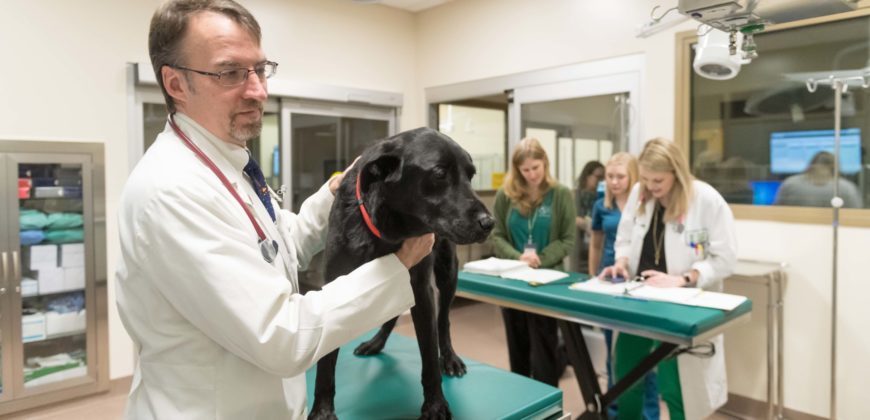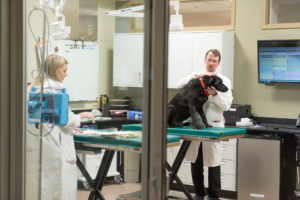
Through its clinical trials for animal patients, Colorado State University helped prove the usefulness of the first drug approved by the FDA for treatment of canine lymphoma, a breakthrough in veterinary oncology that promises new hope for pet dogs with this common type of cancer.
“Across the board, we saw some positive activity in up to 80 percent of all the lymphoma patients that were treated with this medication,” said Dr. Doug Thamm, a veterinarian and cancer researcher who led clinical trials at CSU’s Flint Animal Cancer Center.
The U.S. Food and Drug Administration announced Tuesday that the lymphoma drug, Tanovea-CA1, is approved for use in canine patients and will be available to veterinarians nationwide this spring. This conditional approval may be extended annually with further evidence of effectiveness; full approval is possible in five years.
CSU has been pivotal in the medication’s march to market: VetDC, Inc., is the university startup whose principals a decade ago identified Tanovea-CA1 for its potential in treating dogs with lymphoma. The drug, whose active ingredient is rabacfosadine, was first developed for use in human cancer patients.
Veterinarians with the Flint Animal Cancer Center have been key advisors as the Fort Collins-based VetDC has refined Tanovea-CA1 for veterinary use. CSU veterinarians also helped treat canine cancer patients whose cases contributed proof of the drug’s usefulness. More than 100 dogs were treated with Tanovea at CSU since 2011; 350 dogs were treated nationwide.
CSU and VetDC
Terry Opgenorth, vice president of CSU Ventures, is chief scientific officer and a co-founder of the startup VetDC. CSU advisors include Dr. Rodney Page, director of the Flint Animal Cancer Center; Dr. Stephen Withrow, founder of the Flint Animal Cancer Center; and Dr. Wayne Jensen, professor and head of the CSU Department of Clinical Sciences.

Dane’s rebound
Dane, a golden retriever from Denver, is among the patients to dramatically rebound after treatment with Tanovea-CA1. Just five months ago, his owners thought the 9-year-old golden, who was diagnosed with multiple myeloma, would have to be euthanized because he could no longer stand and wouldn’t eat or drink.
The clinical trials are open for dogs with cancer derived from lymphocytes, a type of white blood cell. This includes multiple myeloma and acute lymphoblastic leukemia.
Christine Loeffler, Dane’s owner, recalled the agonizing family discussion: “He’s got to be put down. He can’t live like this,” her father-in-law told her.
The Loeffler family hoped that enrolling Dane in a clinical trial for the new drug at CSU’s renowned veterinary cancer center would provide a different and successful treatment option. Veterinary clinical trials are just like those in human medicine – offering closely monitored treatment for qualifying patients with therapeutics that are under development and are not yet widely available. Clinical trials for patients with naturally occurring disease are a critical step in commercializing medical therapies for widespread use.
“We wanted to throw what we could at this cancer and get as much time with Dane as we possibly could,” Loeffler said. “We were not ready to call it quits on him yet. He’s still happy, has a zest for life, and he loves his family as much as we love him. We wanted to do whatever we could.”
Last month, Dane was at the Flint Animal Cancer Center for his fifth and final dose of Tanovea-CA1, which is designed to target and attack cancer cells implicated in lymphoma. The dog that couldn’t stand just a few months earlier was wagging his tail during his final treatment.
Originally for human use
Tanovea was discovered by Gilead Sciences Inc., a research-based biopharmaceutical company, and was originally designed to treat lymphoma in human patients. Thamm worked with Gilead years ago to study the molecule that ended up becoming Tanovea-CA1. “We were initially trying to determine whether it was effective in preparation for human development,” he explained.
Gilead decided not to pursue human clinical development of the drug, and VetDC acquired the animal health rights.

Thamm, head of clinical development for VetDC, said Tanovea-CA1 provides a different treatment option. Doses of the drug are given every three weeks, with a total of five infusions. That compares to conventional chemotherapy treatments that require up to 16 weekly visits.
“There are many treatments for lymphoma that are currently available for dogs, but almost all of them are repurposed old human cancer drugs,” Thamm explained. The drugs can be quite effective, but many companion animals need other options for recurring cancer.
Cancer is the leading cause of death in older pets, and veterinarians estimate that one in four dogs will develop cancer. Lymphoma, which typically starts in lymph nodes and other organs of the immune system, is among the most common forms of cancer in pets.
“About 95 percent of dogs, sooner or later, will get their lymphoma back, even if drugs work initially,” Thamm said. “So finding new things that we can offer our clients when this lymphoma comes back is incredibly important. Having another drug in our toolbox that we can reach for, that we know can actually be quite effective for some dogs and doesn’t have to be given very frequently, is a real win.”
Dane’s case is one of those wins.
“It was all that we could hope for,” Loeffler said of her dog’s treatment. “The old Dane is mostly back. He loves his walks, he loves his neighborhood, he loves his two human brothers and his other dog brother. He’s excited when we all wake up in the morning.”